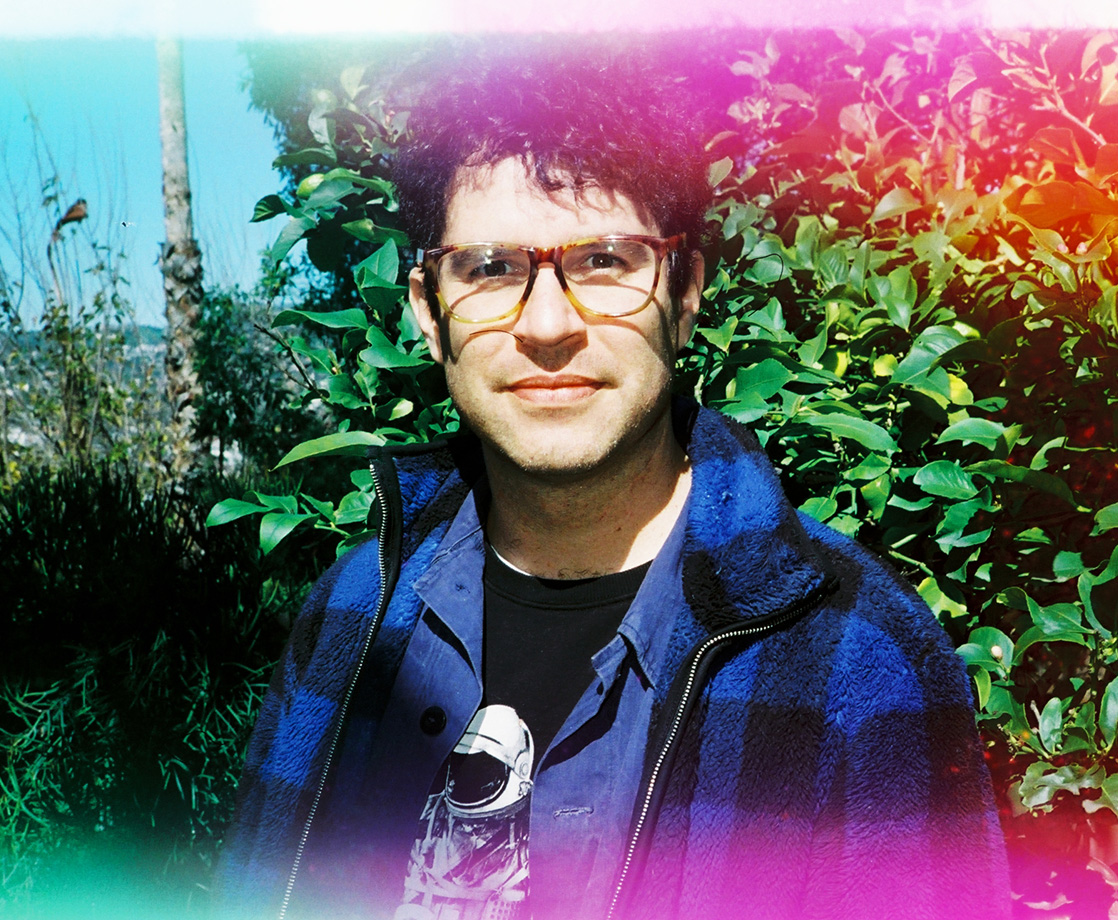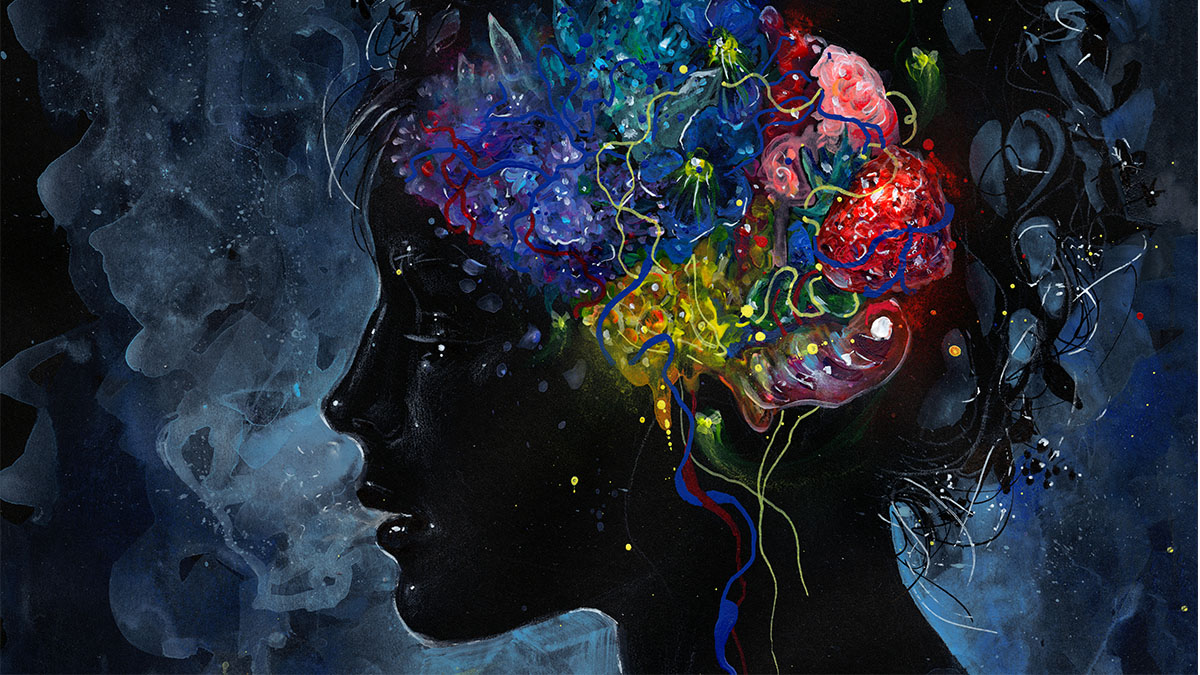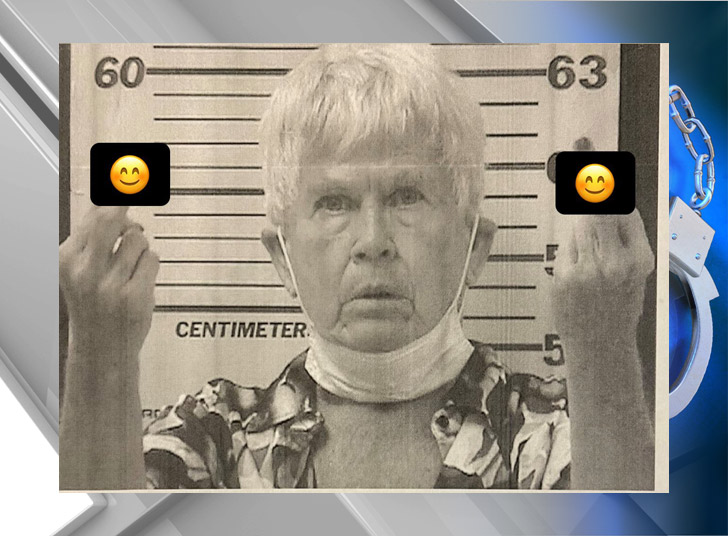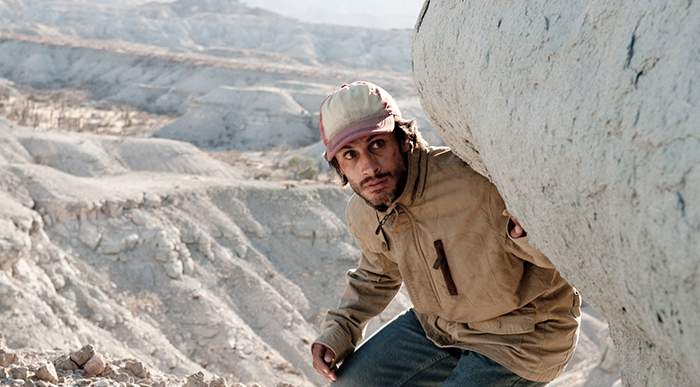Photos by Cody Lynch
Beneath a lemon tree in a backyard in Silverlake, Avey Tare is telling me about microdosing. Not the kind of microdosing my friends do, where they take too much and are actually just on acid all the time. Rather, the Animal Collective co-founder (né Dave Portner) has been embracing the kind that expands concentrative ability, specifically during the recording of his new solo album, Cows on Hourglass Pond (out now on Domino Records). He’s dosing it right. Well… at least he thinks so. “I don’t really know the technical amount, but I get it on sugar cubes. So I imagine one hit per sugar cube, which would be like 90 micrograms or something?”
Cows on Hourglass Pond is its own kind of microdose, a snapshot of a particular phase within the artist’s 20-year career that highlights his pioneering brand of psychedelia. Tracks like “Our Little Chapter” undulate between classic Avey sounds, where bittersweet lyrics meet lilting melodies, whereas the more unexpected tunes, like “K.C. Yours,” feature twangy overtones that point to his newfound love of ‘60s country. Pair that with a meditative acceptance of his past and present life — likely aided by his move to Asheville — and it’s his best solo album to date.
Since Animal Collective debuted in 2000 with Spirit They’ve Gone, Spirit They’ve Vanished — written entirely by Portner, and considered to be more of a solo project than an AC album — he’s pushed the boundaries of psychedelic pop, weaving sonic tapestries with the goal of creating a communal, engaging energy. Think of the ethos-oriented vibe like a punk show, but without the aggression. Whether recording under the (now massive) umbrella of Animal Collective, as a solo artist, or in collaborative projects with lovers and friends (Avey Tare’s Slasher Flicks, Terrestrial Tones), every song comes from a specific, intimate place.
The aural environments Portner created for 2016’s Down There, and 2017’s Eucalyptus were decidedly darker, which he says was a reaction to turbulence in his life stemming from AC’s hectic tour schedule. He’s been feeling serene after relocating to Asheville, though, and that tranquil energy is immediately noticeable on the latest LP. On “What’s the Goodside” he coos, “We’re getting old now,” symbolic of the overall buoyancy throughout the album’s 45 minutes.
“It’s the first record I’ve done alone where I felt grounded,” he says, looking healthy in the late morning sun, his brown hair loose, still tousled from the night before. On top of discussing his general contentment with life, the artist chatted with MERRY JANE about all things Cows, his recent embrace of outlaw country, and, of course, acid.
MERRY JANE: How did you start making music?
Avey Tare: Apparently, when I was three, I asked my parents for piano lessons. My mom said I really wanted them. I played classical piano Suzuki-style until I was 18. I wasn’t the most diligent student, but I liked to play. My dad was always playing piano. Not like a professional or anything, but nightly at our house he would always play piano. So it was kind of that vibe, of us being a musical family. I just grew up always loving music, with music being pushed down my throat.
I remember when I first heard you guys in the early 2000s on albums like Spirit They’ve Gone and Sung Tongs, I was so blown away. The music just didn’t sound like anything I had ever heard before. How did this structurally unique sound come about?
Part of it had to do with the members of Animal Collective just having such diverse tastes. Over the years of knowing each other, we’ve definitely kind of fell in line with one another. But, back in high school, Noah [Lennox] was strictly electronic. Josh [Caleb Dibb] came from more of a classic rock, Led Zeppelin-y, kind of hard rock background. Brian [Weitz] and I had the liberty of getting really into experimental music — 20th Century classical composition and that kind of stuff — at a really young age. So it was a combination of being opened up to tons of stuff, and then working at the record store Other Music in New York City. There, I just had so much music at my fingertips. I would borrow everything, and got really into music from around the world.
The early releases have this kind of high energy, ritualistic feeling that was so different than the stuff coming out in the late ‘90s and early ‘00s, regardless of genre.
When I started going to shows in New York, everybody my age was playing hardcore or post hardcore. Even the band Black Dice, which I think is one of the best bands, was a post hardcore band back then. So that was the kind of stuff I was seeing, thinking, This is cool, but we don’t do that really. We were into a different kind of song writing. So it brought me to [the question], How do we take the music we like but give it that energy of Lightning Bolt or Black Dice?
It’s rare to be able to experience the intense excitement and community that makes punk and hardcore shows so fun without the anger and violence that comes with them. How did you carry that into your solo work?
The youth is always wanting to rebel. It’s all cyclical. I wanted to hear and see something that was more like anarchy, but also something ritualistic. Something that would bring a crowd together so it felt like everyone was having a [shared] experience. It really became about figuring out what energy we could put into the show to get people into it and make them feel like they were experiencing something new.
Cows on Hourglass Pond is an interesting name. Where did it come from?
I live in North Carolina, and almost every day I would pass by these really, really large cows that I was always enamored with. Also, I had been making a few cross country drives at the time. At some point in Colorado, or the Midwest, somewhere where there’s a lot of open land, I saw cows near a frozen pond on a farm. The image of cows standing on the frozen pond became a cool, kind of surrealist painting in my mind. The title just started developing from there. First it was Cows on a Frozen Lake, but then I saw the word “hourglass” somewhere and thought that it was the word I needed to make the title sound right.
The influences you’ve noted for the album range from Buddy Holly and Waylon Jennings to “robots.” Can you expand on that?
The early rock and roll thing over time has become a huge part of my life. Bo Diddley, specifically, Buddy Holly, then moving into ’60s country, probably from living in North Carolina, where it’s around me more than it’s ever been around me before. The way that music is recorded, and the way the acoustic guitars are used, they’re kind of more windy to me. They set this background texture that hints at the melodies and chords. I started getting interested in those kind of recording techniques. I’m always so into recording, ever since high school. We all have been. It’s always great to make discovering something new a part of the process, but it’s challenging.
How does this album reflect changes in your life, or what do you think it says about you right now?
For me, putting out my solo stuff is more of a milestone kind of thing. It’s like, I’m at this point in my life and this record is going to encapsulate all that I’m feeling right now. I feel like the last couple I’ve done, Eucalyptus and Down There, specifically Down There, have been more about darker periods in my life. With this album, I had just left LA, and I wanted to make it feel more positive. There’s still a sadness to some of the songs, but also those are just the kinds of songs I like writing.
Is there a structure to the album? What are the songs at the end about?
Whereas Down There was more of a cycle of songs, and Eucalyptus, too, I saw the whole record as this piece to listen to all the way through — more a collection of songs I was really into. I wanted the song elements of them to stand out more. “Our Little Chapter” is definitely about friendship and its different facets, with my life in mind, of course. Each line can be associated to a different friend in my life.
What was the recording process like?
I recorded it at home on a Tascam 48. I’ve had it since I was 17. Brian [Weitz from Animal Collective] and I collectively borrowed money from our parents, which we worked to pay back, and then learned to record on it. I’ve used it since. We recorded most of Sung Tongs on it, and all of Spirit They’ve Gone on it. There’s things about the way tape sounds…
I really wanted this album to have a tape quality, circling back to Buddy Holly, and that kind of feeling of music. I’m not one to get down on digital music, because I partly grew up in the era of digital music being important. I’m no Neil Young, but I appreciate that side of things. There’s a certain quality that analog music has, to me, that digital music, no matter what anybody says, does not have. I wanted it to have an analog feel without feeling lo-fi.
But not intentionally analog, right?
Yeah, not like a bedroom recording. Hopefully it doesn’t. Even though I did just spend the last winter locked in my house microdosing LSD a lot.
How much would you take? I feel like a lot of people think they’re microdosing but are actually just on acid all the time.
I don’t really know the technical amount, but I get it on sugar cubes. So I imagine one hit per sugar cube which would be like 90 micrograms or something?
Basically I just try to do a very small fraction. I want to be able to think. I just started reading and talking to a lot of people about the concentrative aspects of LSD. I have some friends who really swear by that side of psychedelics. I was interested, and had the time to do it. However, there were the days where I would take too much and be like, Alright, this day’s up.
Animal Collective is now this huge, constantly touring band that’s maintained a presence for close to two decades now. Does it ever feel stale?
Actually no, and especially not lately. I feel like post-Merriweather moving into Centipede Hz, there was a fear of us burning out. By the end of the Merriweather tour we were pretty maxed out. And that happens at the end of most tours, but then that went into the Centipede Hz era, which, to me, became a nightmare. I started getting sick all the time on tour and having to cancel shows.
What kind of sick?
Getting throat infections, strep throat, stuff that just shut down my voice so I’d have to cancel shows completely. It started depressing me because it just prolonged the time that we were going to have to tour. I hadn’t felt grounded in a home for a minute. After that phase, I needed to rediscover what it meant to have a home, and certainly Ashville has done that. It’s a really positive thing about this record. It’s the first record I’ve done alone where I felt grounded.
Is it freeing to be able to create your solo albums?
Going back to the stale thing, that’s what keeps it alive. It’s only the times where we feel like we’re getting pushed into label stuff, like “This is the way you have to do things,” or “This is your album cycle time,” where it starts to feel like it’s moving in a direction that we never wanted to be about. [But] we feel like we really couldn’t think of a better situation for ourselves. We have so much liberty. And our fans seem to be endlessly open-minded.
Avey Tare’s “Cows on Hourglass Pond” is out now via Domino Records. Order a copy of the record here
Follow Linsday MaHarry on Instagram











